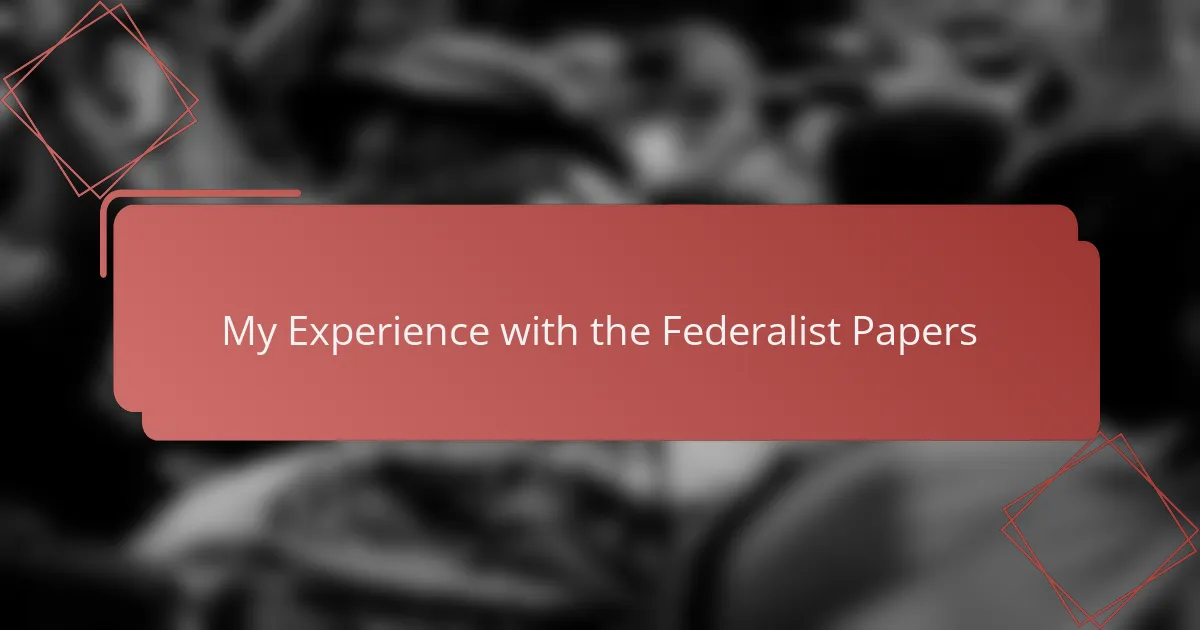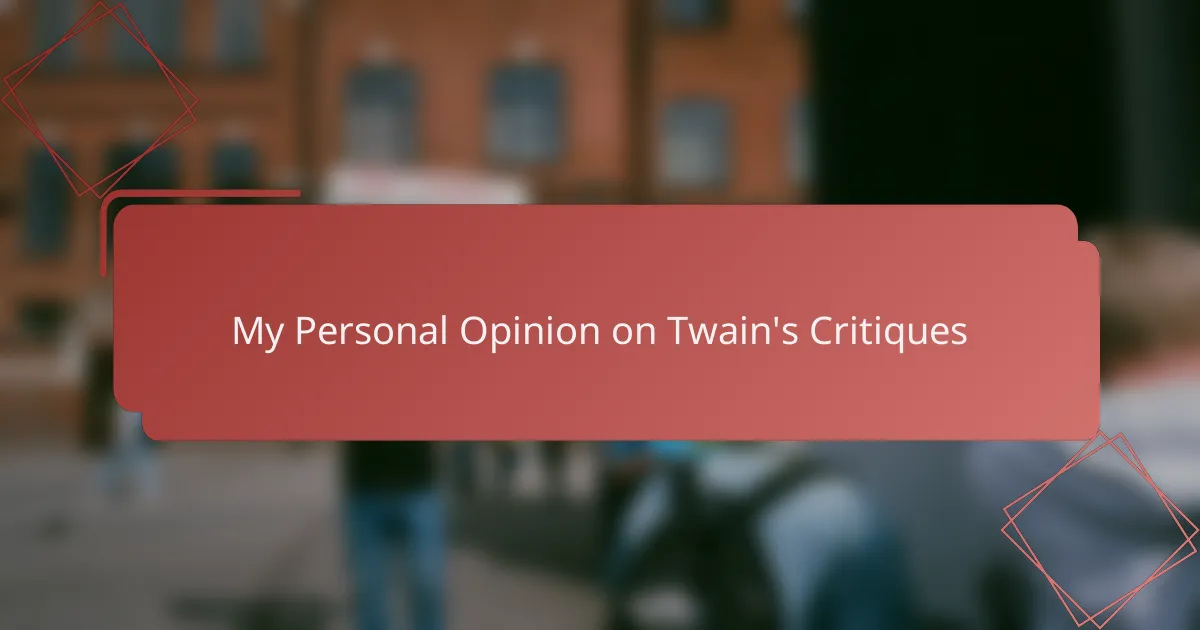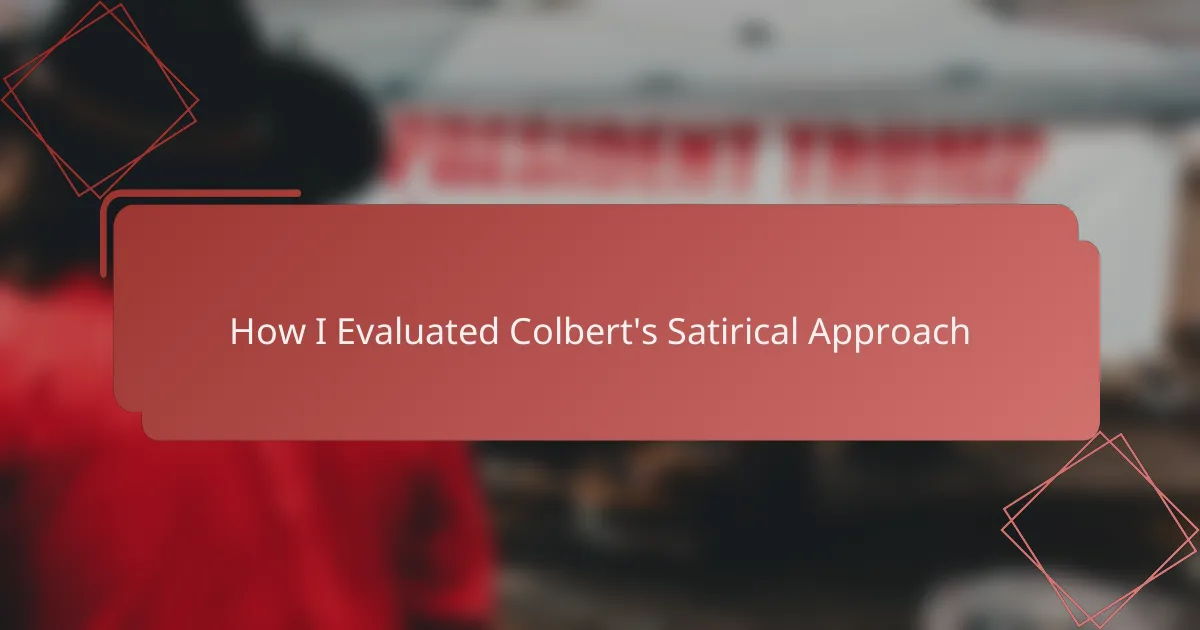Key takeaways
- Wit in literature blends humor and insight, allowing readers to reflect on human nature and societal absurdities.
- P.G. Wodehouse’s style employs gentle satire, using playful language and exaggerated characters to critique political and social issues without harshness.
- Political satire, particularly Wodehouse’s, encourages reflection and discussion, making complex topics accessible and engaging through humor.
- Effective satire can disarm tension by using warmth and kindness, inviting audiences into the critique rather than alienating them.
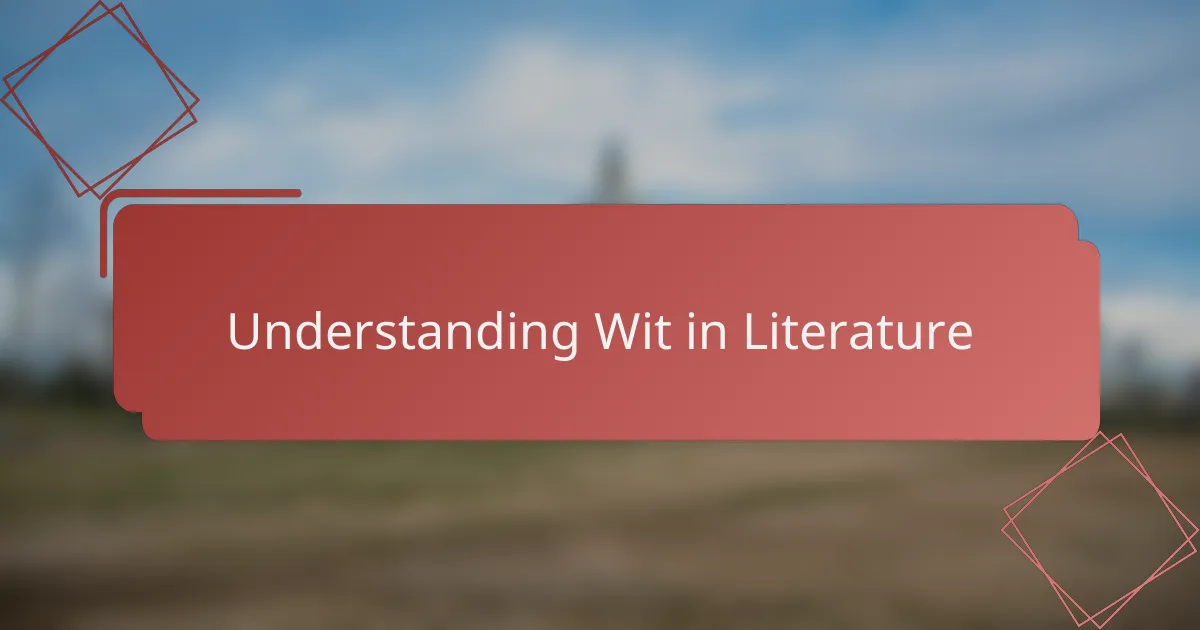
Understanding Wit in Literature
Understanding wit in literature requires recognizing how authors use language cleverly to evoke humor and insight simultaneously. From my experience, wit often feels like a delicate dance of words—sharp, unexpected, yet deeply revealing about human nature. It’s more than just jokes; it’s a mirror reflecting social quirks with a knowing smile.
I recall first encountering P.G. Wodehouse’s wit and being struck by how effortlessly he balanced satire with warmth. His humor is not harsh or cynical but gently mocks the absurdities of society, making the reader both laugh and think. That blend, I believe, defines the true art of wit in literary satire.
| Aspect | Understanding Wit in General | P.G. Wodehouse’s Wit |
|---|---|---|
| Purpose | To amuse and provoke thought | To gently satirize society and human folly |
| Tone | Often sharp, sometimes ironic | Lighthearted, warm, and playful |
| Technique | Wordplay, irony, paradox | Comic exaggeration, clever dialogue, situational irony |
| Emotional Impact | Varies from biting to subtle | Consistently uplifting and humorous |
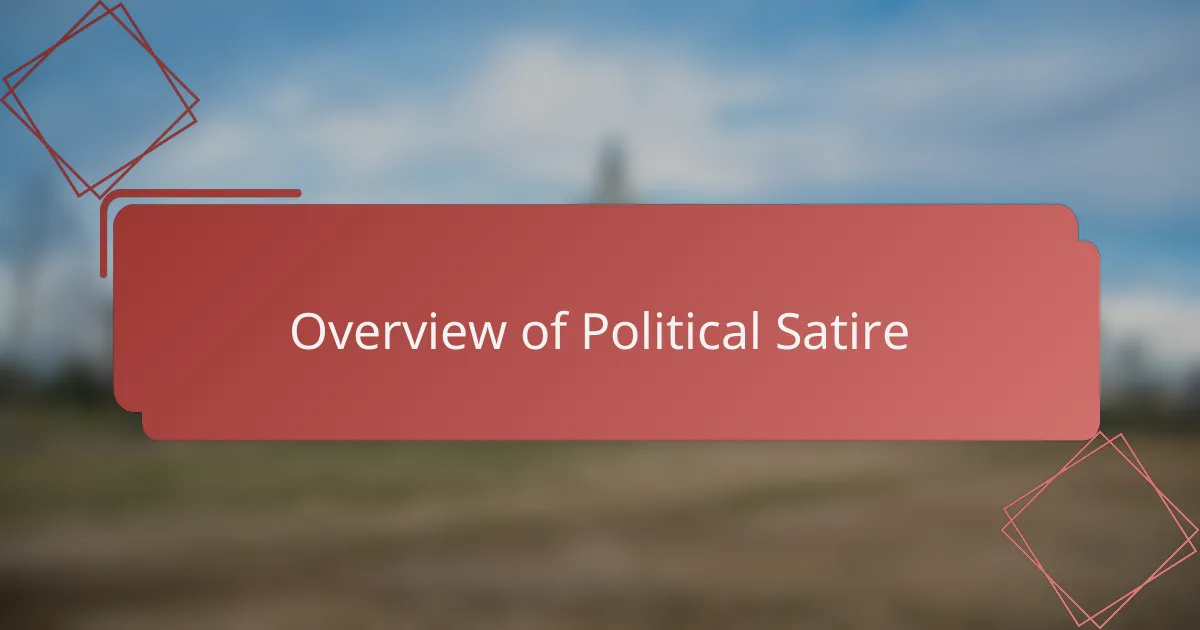
Overview of Political Satire
Political satire has always struck me as a powerful tool to critique and reflect on societal flaws through humor. It blends sharp wit with insightful commentary, making complex political realities more accessible. From my experience, good political satire both entertains and provokes thought, pushing readers to reconsider their views while enjoying the cleverness of the narrative.
| Aspect | Political Satire |
|---|---|
| Purpose | To expose and criticize political corruption, hypocrisy, and societal issues through humor and irony. |
| Style | Often sharp, witty, and sarcastic, aiming to engage and challenge the audience intellectually. |
| Impact | Encourages reflection, debate, and sometimes reform, by making politics relatable and approachable. |
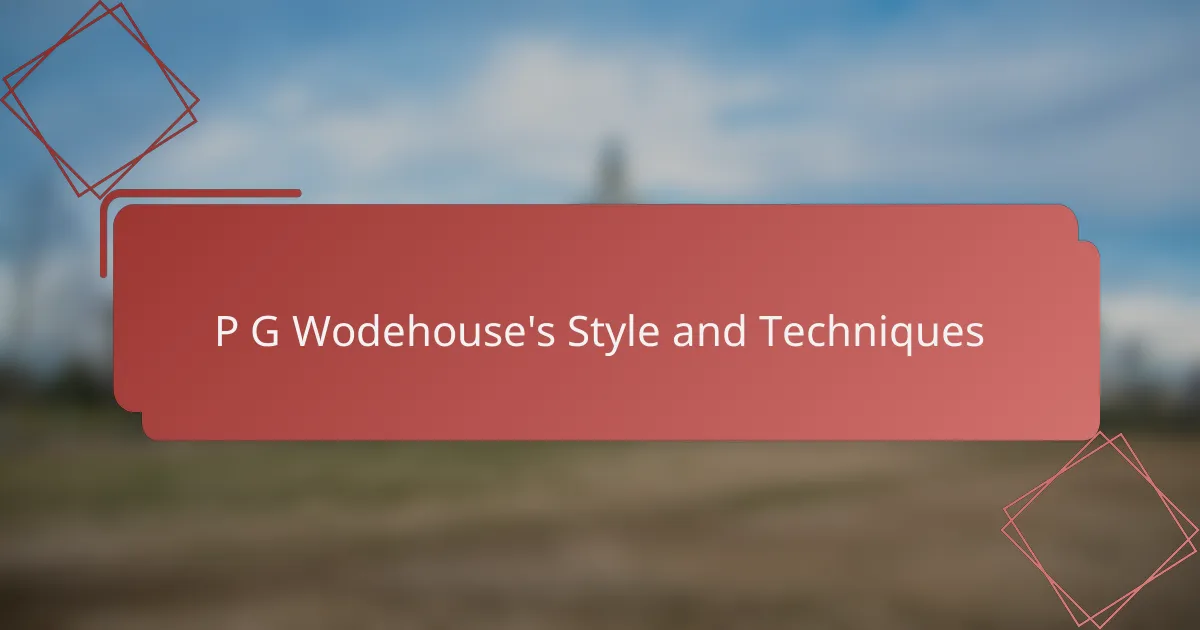
P G Wodehouse’s Style and Techniques
P G Wodehouse’s style is uniquely lighthearted, relying heavily on wit that feels effortless yet meticulously crafted. What I find fascinating is his use of playful language—especially his clever wordplay and inventive similes—that never descends into pretentiousness. His technique of layering humor through irony and understatement often makes me chuckle at the subtlety, as if I’m in on an inside joke.
| Technique | Effect |
|---|---|
| Wordplay & Puns | Adds a playful, clever tone that keeps prose engaging and upbeat |
| Irony & Understatement | Creates humor by downplaying absurd situations, inviting readers to read between the lines |
| Inventive Similes | Paints vivid and amusing images that enhance the whimsical atmosphere of the stories |
| Light, Breezy Narrative | Keeps the mood buoyant even when addressing social foibles or contradictions |
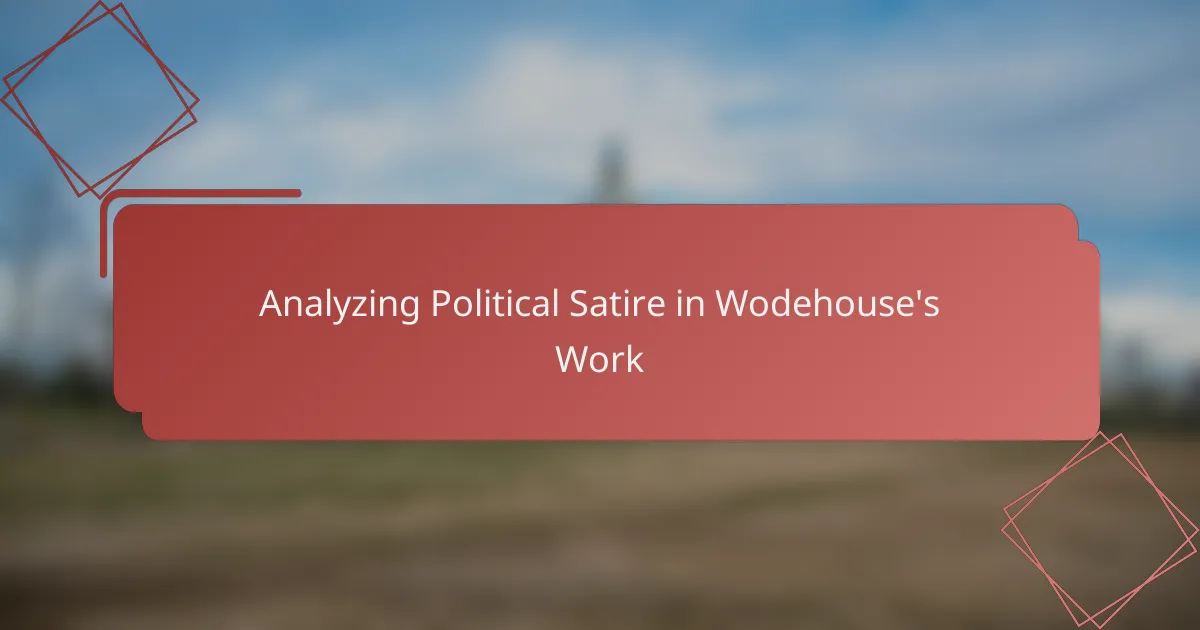
Analyzing Political Satire in Wodehouse’s Work
P.G. Wodehouse’s political satire may not scream the loudest in the arena of political commentary, but his subtle wit on politics has always struck a chord with me. In his work, the political undertones are cleverly woven into the absurdities of bureaucracy and class, making me chuckle at how timeless his observations really are. It’s like he’s inviting us to see the ridiculousness behind the solemn facade of political structures without ever sounding preachy.
One detail that stood out to me was how Wodehouse used exaggerated characters to lampoon political figures and societal norms, highlighting their inefficiencies and quirks with a light touch. This technique not only entertained me but also made me reflect on how satire can be powerful even when it’s gentle and humorous—something I hadn’t fully appreciated before diving into his work.
- Uses exaggerated characters to critique political and social bureaucracy
- Highlights the inefficiencies and quirks of the political class through humor
- Employs subtlety, avoiding direct confrontation but still making sharp observations
- Combines lightheartedness with incisive commentary for a lasting effect
- Engages readers by blending absurdity with familiar political realities
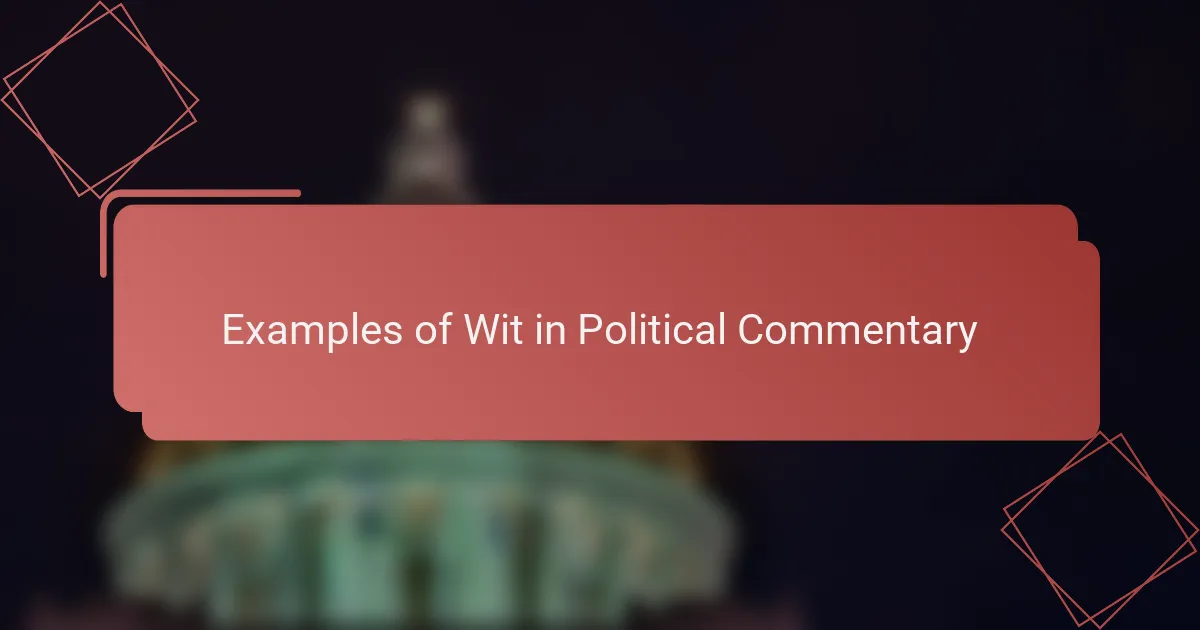
Examples of Wit in Political Commentary
When I think about examples of wit in political commentary, Wodehouse’s approach always comes to mind because of its subtlety. Instead of hitting you over the head with blatant criticism, he sneakily exposes the absurdities of political life—like a court jester who makes the king laugh while slipping in truths that sting just enough. Have you ever noticed how his exaggerated characters almost become caricatures of politicians, yet remain oddly endearing? That’s the kind of wit that invites us to think without feeling attacked.
One moment I particularly appreciate is how Wodehouse mocks the endless red tape and bureaucratic nonsense by presenting them through comically inefficient officials trapped in ridiculous predicaments. This makes me realize that his wit isn’t just about humor; it’s a lens that reveals the inefficiencies embedded deep within political systems. Isn’t it fascinating how laughter can be a gentle but powerful way to provoke political reflection?
What strikes me most is Wodehouse’s skill in blending lightheartedness with sharp insight. His commentary feels like a playful nudge rather than a harsh slap, which somehow makes the critique linger longer in my mind. It makes me wonder: can political satire be just as effective, if not more so, when it’s wrapped in warmth and affection rather than bitterness? From my perspective, Wodehouse certainly shows us that it can.
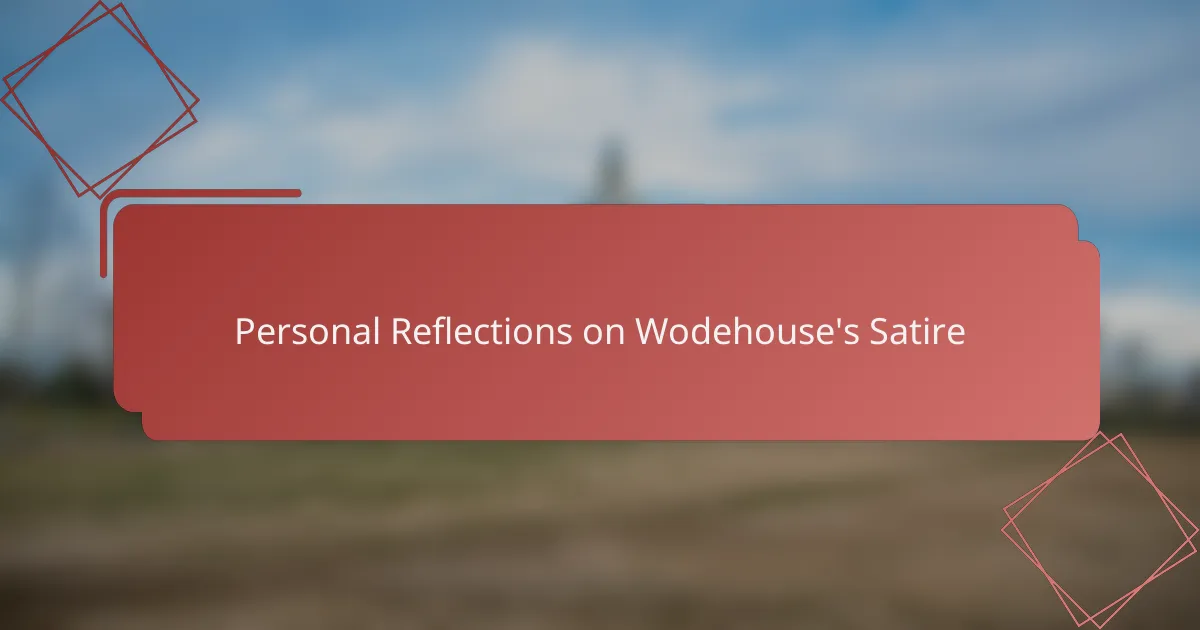
Personal Reflections on Wodehouse’s Satire
Wodehouse’s satire has always felt refreshingly gentle to me, like a soft breeze rather than a biting wind. I remember reading one of his stories and realizing how his lighthearted teasing of political absurdities made me laugh while quietly nudging me to think about the folly behind the farce. It’s rare to find satire that disarms you with warmth yet leaves a thoughtful imprint.
What I find especially compelling is how Wodehouse’s satire doesn’t rely on outrage or harsh judgment. Instead, he invites readers into the joke, sharing a wink rather than wielding a weapon. This approach made me reconsider how satire might connect more effectively when it feels inclusive and kindly rather than confrontational—doesn’t that shift the way we engage with critique?
Sometimes I wonder if the true strength of Wodehouse’s wit lies in its subtlety. His exaggerated characters and absurd scenarios may seem purely comic, but beneath the laughter, they hold a mirror to political rituals and human weaknesses. For me, this slow reveal of insight makes his satire linger longer and resonate deeper, showing that humor and wisdom can walk hand in hand.

Applying Wodehouse’s Wit Today
Applying Wodehouse’s wit today feels like uncovering a treasure chest in the often heavy world of political satire. His lighthearted yet sharp observations remind me how humor can disarm tension and invite reflection without bitterness. I’ve found that channeling his style helps me digest complex political issues with a smile rather than frustration.
Incorporating Wodehouse’s wit requires balancing cleverness with kindness—a lesson I’ve learned firsthand when humor risks alienating. His ability to make fun of authority without cruelty shows how satire can be both entertaining and constructive.
- Use gentle irony to expose political absurdities without harshness.
- Employ playful exaggeration to highlight contradictions in political rhetoric.
- Focus on character quirks rather than personal attacks when critiquing politicians.
- Infuse humor with empathy to maintain respect for all viewpoints.
- Keep language accessible and witty, avoiding jargon or bitterness.

